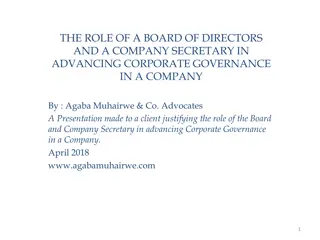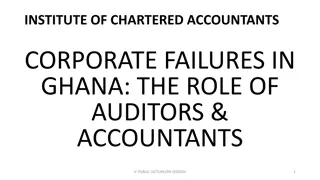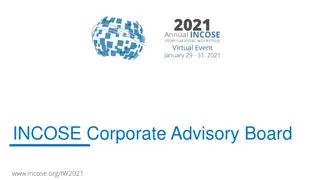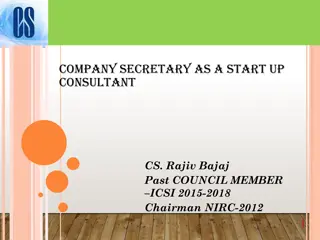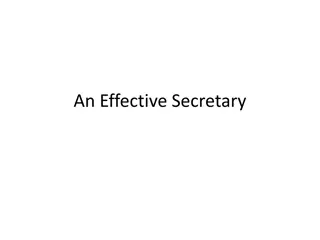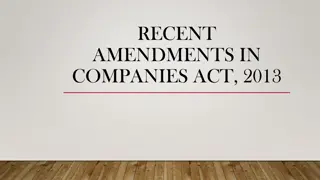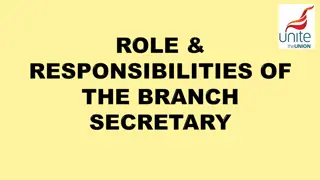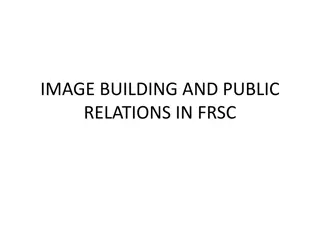The Evolving Role of the Modern Corporate Secretary
The role of corporate secretaries has evolved significantly, from being mere clerks to now actively making representations, entering contracts, and playing crucial roles in company operations. This evolution is reflected in modern Companies Acts and the day-to-day business operations. Corporate secretaries today engage in shareholder & investor relations, board meetings, compliance with regulations, and possess core competencies such as emotional intelligence, communication skills, and adaptability.
Download Presentation

Please find below an Image/Link to download the presentation.
The content on the website is provided AS IS for your information and personal use only. It may not be sold, licensed, or shared on other websites without obtaining consent from the author. Download presentation by click this link. If you encounter any issues during the download, it is possible that the publisher has removed the file from their server.
E N D
Presentation Transcript
THE EVOLVING ROLE OF THE MODERN CORPORATE SECRETARY Frances Bain-Cumberbatch Group Head of Legal & Corporate Secretary ANSA McAL Limited
TIMES HAVE CHANGED. A COMPANY SECRETARY IS A MUCH MORE IMPORTANT PERSON NOWADAYS THAN HE WAS IN 1887. THIS APPEARS NOT ONLY IN MODERN COMPANIES ACTS, BUT ALSO BY THE ROLE WHICH HE PLAYS IN THE DAY-TO-DAY BUSINESS OF COMPANIES. HE IS NO LONGER A MERE CLERK. HE REGULARLY MAKES REPRESENTATION ON BEHALF OF THE COMPANY AND ENTERS INTO CONTRACTS ON ITS BEHALF WHICH COME WITHIN THE DAY TO-DAY RUNNING OF THE COMPANY S BUSINESS ALL SUCH MATTERS NOW COME WITHIN THE OSTENSIBLE AUTHORITY OF A COMPANY SECRETARY
Every Company shall have a Secretary and may have one or more assistant secretaries, who, or each of whom (a) shall be appointed by the Directors, or if provision Is made in the Bye laws of a company for the appointment, in accordance with that provision; (b) may be an individual, a body corporate or a firm Section 61(1) of the Companies Act
Shareholder & Investor relations Board & Committee Meetings Interfacing with shareholders. Scheduling Designing Communication plan with Institutions Agendas Meeting presentations Minutes Compliance with Securities Markets TTSEC, SEC Annual Meeting of Shareholders Legal Documents Notice, Proxy Form, Management Proxy Circular, Financial Statements Regulatory Filings and Disclosures TTSEC and SEC Company Representative with the Regulators Facilities Management Communications (script writing; Q&A) Executive liaison Compliance Chairperson & Board Ensuring compliance with By-Laws and Articles and Corporate Charters Board and Committees Board & Management
CORE COMPETENCIES HIGH Emotional Intelligence and Self awareness Having a thorough understanding of the company s business Having good knowledge of corporate and securities laws, Having solid communication skills and an executive presence Staying current with changes in corporate governance and giving the board and managers a heads up about new developments Being able to work and achieve a consensus within multidisciplinary settings Being flexible, creative and detailed Remaining calm under pressure and not losing sight of perspective
THE CORPORATE SECRETARYS ROLE AS THE CHIEF GOVERNANCE OFFICER
WHY IS CORPORATE GOVERNANCE IMPORTANT? It is the corner stone of any good business. It encompasses the processes, practices and policies that a company relies on to make formal decisions and to manage the company. Employing good corporate governance helps the company to regulate risk and reduce the opportunity for corruption. Good Governance drives good Business results and increases investor confidence.
Maintaining the Integrity of the Companys Governance processes Getting and Keeping Corporate Governance on the Board Agenda Design & Maintain relevant governance processes and structures through regular reviews and updates to the Board Manual and other Governance Documents Keep current on evolving practices in corporate governance and advise the Board. Serve as chief expert and advisor on all corporate governance matters for Directors and employees Administer the corporate code of conduct and other Board policies
New Director Orientation Director recruitment Create and maintain a thorough induction Programme for new directors Help the Board develop through its Nomination Committee recruitment criteria for new Directors (skills, experience, attributes, diversity, independence) Draft and maintain roles and responsibilities for the Board and Directors and its Committees Support the Board to include diversity as a Board composition factor, increasing the number of women on the Board and greater diversity of skills, ethnicity, cultural background and age. Recommend that sustainability be included in the skills matrix and that at least one Director have skills / experience in corporate sustainability. Continuing Director s training Develop Director s Continuing education policy Make recommendations to directors for ongoing training Director Compensation Make recommendations based on surveys and company culture
Compliance Ensuring compliance with Board and Committee Charters and Governance Guidelines. Preparing internal and external communications on governance. Administering and ensuring compliance with the Company s Code of Conduct Developing processes to identify and approve related party transactions. Developing policies and policy manuals intended to keep the company current with governance best practices




